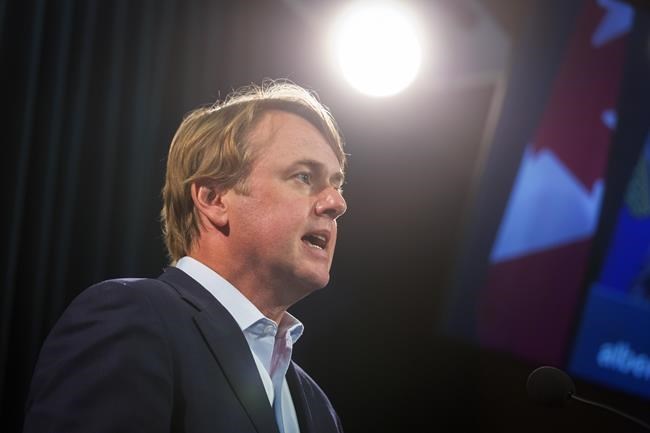EDMONTON — Alberta will move more patients to other care settings to free up space in hospitals so overrun with COVID-19 cases that some children's surgeries, cancer surgeries and transplant operations are being cancelled.
Dr. Verna Yiu, the president and CEO of Alberta Health Services, says there may be 200 potential patients that could be moved into continuing care in the next week or two.
Yiu said intensive care beds are 130 per cent over capacity, and critically ill patients are being directed to overflow wards.
"We are experiencing significant capacity challenges. We continue to do all that we can to increase capacity, particularly in our ICUs, where pressure on our staff, physicians and resources is intense," Yiu said Thursday.
Non-emergency surgeries were cut by as much as 60 per cent provincewide last week and the Calgary health zone has cancelled all non-urgent procedures for the rest of the week.
Yiu said some of the delayed surgeries include pediatric operations, transplants, and cancer operations that physicians feel can be put off without risk to the patient.
Alberta has averaged more than 1,000 daily COVID-19 cases for two weeks. There are now 679 people in hospital with the illness, 154 of whom are in intensive care.
Yiu said there are 231 people getting critical care when you add in the non-COVID patients. Even with the extra beds, the ICU capacity is still high at 87 per cent.
Almost 90 per cent of the COVID patients in ICU are unvaccinated or partially vaccinated, and Yiu urged more Albertans to get the jab.
"Health care is a finite resource and we need the help of all Albertans to protect it," she said.
Health Minister Tyler Shandro announced $36 million to help care agencies hire more staff or increase resources for home care and other care-home settings in order to get more patients out of hospitals.
Shandro, asked repeatedly by reporters if Alberta will adopt a provincewide vaccine passport similar to other jurisdictions, said the idea is complex and needs further study.
"We're continuing to look at evidence from other jurisdictions and what our opportunities might be here in Alberta," he said.
Premier Jason Kenney has staunchly refused to mandate proof of vaccination for anyone who wants to use non-essential services such as restaurants, clubs and sports events.
The premier has questioned whether so-called vaccine passports violate health privacy, but said his government will make available a downloadable QR code for those who need to show proof of vaccination.
A number of Alberta businesses and sports teams are demanding or will be demanding patrons show proof.
A vaccine passport is a controversial plan that surveys suggest would be popular with Albertans and provide a strong incentive to get vaccinated. It has, however, led to demonstrations in Quebec and B.C. from those who feel the passports are a privacy intrusion.
Kenney has faced criticism from some members of his own caucus, particularly in rural areas, who earlier in the pandemic protested that some health restrictions were unnecessary and intrusive.
One of those backbenchers, Peter Guthrie, chastised Kenney in a public letter this week, saying he is making things worse by singling out the unvaccinated in a "disparaging and accusatory tone."
The Opposition NDP say Kenney is kowtowing to these fringe elements, refusing to enact policies like vaccine passports in order to keep his caucus from fracturing.
NDP health critic David Shepherd said Kenney's government has failed to deal with rising COVID cases by avoiding measures such as vaccine passports.
"This is continued cowardice from Jason Kenney as he fails to address the real problem which is the unchecked spread of COVID-19 among the unvaccinated," said Shepherd.
"Jason Kenney created this crisis, and now Albertans are left to watch as he and his cabinet are paralyzed by politics."
Shandro rejected such suggestions, saying their policy is guided by public health.
"Quite frankly, the biggest criticism of us over the last 18 months is we have not been making our decisions political enough," he said.
Alberta is among the hardest hit in Canada in the fourth wave of COVID-19, propelled by the more contagious Delta variant.
It was a risk dismissed by Kenney on June 18, when he announced almost all health restrictions were being lifted and boasted that Alberta was open for good.
He downplayed the threat of the Delta variant at that time, noting infection numbers were small and localized.
In August, Kenney, Shandro and Dr. Deena Hinshaw, the chief medical officer of health, were criticized when the government largely fell silent as the Delta variant took off in Alberta. It has sent case numbers and hospitalizations to heights not seen since the third wave and threatens to collapse the health system.
Last Friday, Kenney announced modest changes, ordering pubs and bars and restaurants to stop serving alcohol after 10 p.m. and reinstituting a provincewide mask mandate for indoor public spaces and workplaces.
Kenney also announced his government would give $100 to anyone who would get a first or second shot of COVID-19 vaccine.
Alberta trails the nation in vaccinations. Almost 71 per cent of those eligible, age 12 and over, have had both doses, and the majority of those in hospital with COVID-19 are unvaccinated.
This report by The Canadian Press was first published Sept. 9, 2021.
Dean Bennett, The Canadian Press



